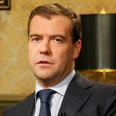
Russia's Medvedev does not rule out Iran sanctions
'Sanctions not very effective on the whole, but sometimes they are needed,' Kremlin head says. Tehran's nuclear energy chief says reached agreement with IAEA to set new framework for better cooperation, adding world powers could raise any question they wished at scheduled talks
Russian President Dmitry Medvedev said on Tuesday he did not rule out fresh sanctions against Iran over its nuclear program.
The Kremlin chief noted that it was not only the West which was concerned about Iran, but he said the international community needed to tread carefully when discussing any possible sanctions against the Islamic Republic. "Sanctions are not very effective on the whole, but sometimes you have to embark on sanctions," Medvedev told the Valdai discussion group of Russia experts in Moscow.
US President Barack Obama, who came into office pledging a policy of engagement toward Iran, has suggested Tehran may face harsher international sanctions if it does not accept good-faith talks by the end of September.
Iran last week turned over a package of proposals to world powers in which it said it was willing to address global nuclear disarmament and other international issues.
Russian Foreign Minister Sergei Lavrov last Thursday said the proposals could be a basis for negotiations.
But Lavrov said the United Nations Security Council would not support oil sanctions against Iran, the world's fifth-largest crude oil exporter and a major importer of gasoline.
Russia has a permanent seat on the council and the power of veto.
Also on Teusday, Iranian nuclear energy chief Ali Akbar Salehi said he had agreed new measures of cooperation with UN inspectors during talks on Tuesday with the director of the International Atomic Energy Agency.
The IAEA did not comment immediately on the deal which coincides with a diplomatic thaw between Iran and world powers, signaled by a plan for talks on Oct. 1, and which was prompted by rising concern about Iran's drive for nuclear capability.
Salehi declined to say what the new cooperation entailed but it would not cover the IAEA's probe into intelligence reports suggesting Iran covertly researched nuclear weapon designs. Iran has said the reports are fabricated and the issue is closed. "We managed to come to an agreement to set a new framework for better and deeper cooperation in the future," Salehi told reporters, summarizing talks with IAEA chief Mohamed ElBaradei during an annual meeting of the agency's 150 member states.
"Details will be revealed at the proper time. We hope we will be witnessing in the future improved cooperation (with the IAEA). And we think the international environment is also very conducive to this issue..."
'This is just like a movie'
Last month, Iran agreed to longstanding IAEA demands for tighter surveillance of its rapidly expanding Natanz uranium enrichment plant and restored some access to a heavy-water reactor of proliferation concern.
But the IAEA has called for more far-reaching transparency from Iran to defuse mistrust around its nuclear ambitions.
It wants Iran to permit snap inspections ranging beyond declared nuclear sites to verify that no secret work devoted to "weaponizing" nuclear know-how is going on, and address what it calls credible intelligence pointing to past military dimensions to enrichment rather than just deny it without offering proof.
"The alleged studies (intelligence) is from our point of view a dead issue. This is just like a movie which is very consistent and comprehensive but at the end it is a fiction," Salehi said, speaking in English.
"We are not here to prove the fictional movie is real..."
Iran has said it is enriching uranium only for electricity, not to perfect means to fuel atom bombs as the West fears.
Iran has agreed to wide-ranging talks with six world powers, likely to be held in Turkey. It has ruled out discussing its own nuclear activities, but Salehi said on Monday the powers could still raise any question they wished at the talks.










